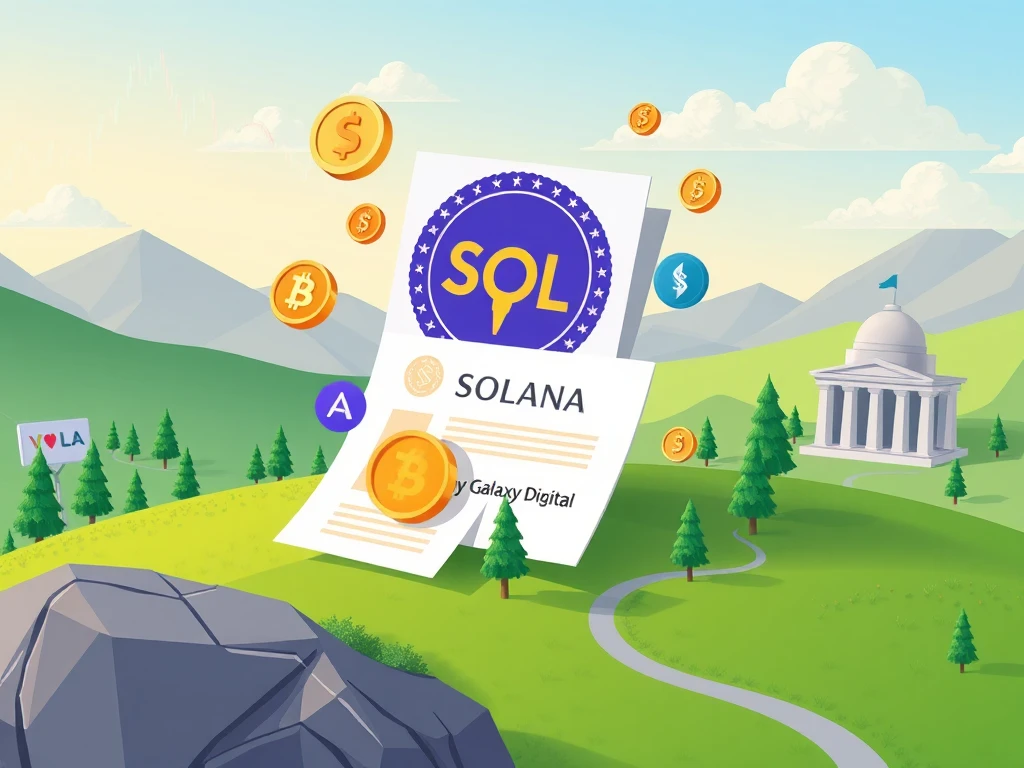Exciting Development: Invesco Galaxy Files for Solana ETF, Igniting Altcoin Race

Get ready, crypto enthusiasts! The race for a spot Solana Exchange-Traded Fund (ETF) is heating up. A significant new player has just entered the arena, signaling growing institutional interest in assets beyond Bitcoin and Ethereum. This development could pave the way for easier access to Solana for traditional investors, marking another step in the integration of digital assets into mainstream finance.
Invesco Galaxy Enters the Solana ETF Competition
The latest news making waves in the crypto market is the formal entry of Invesco and Galaxy Digital into the competition for a Solana ETF. These two firms have collaborated to submit the necessary initial documentation to US regulators. This filing marks the ninth proposal for a spot Solana ETF that the Securities and Exchange Commission (SEC) will need to consider. This surge in filings demonstrates a clear interest from asset managers in offering products that track the spot price of Solana (SOL), which currently holds a significant position among cryptocurrencies by market capitalization.
The move by Invesco Galaxy follows the successful launches of Bitcoin ETFs earlier in the year and the subsequent, albeit more modest, launches of Ether ETFs. Asset managers are keen to gauge and capitalize on market demand for so-called altcoins, providing investors with regulated investment vehicles.
Understanding the SEC Filing Process for a Solana ETF
When a firm like Invesco Galaxy wants to launch a new investment product like a Solana ETF, they must go through a formal process with the SEC. The recent submission is known as a Form S-1 registration statement. Think of the S-1 as the initial blueprint – it tells the SEC that the firm intends to launch a specific security and provides details about the proposed fund. Key information included in this filing indicates that the planned Invesco Galaxy Solana ETF intends to directly hold Solana tokens, similar to other competing proposals. If approved, the fund is slated to trade on the Cboe BZX exchange under the ticker symbol “QSOL”.
However, the S-1 is just the beginning. For the SEC to officially start the clock on reviewing the proposed rule change required to list the ETF on an exchange, the firms must also file a Form 19b-4. This document formally requests the exchange (Cboe BZX, in this case) to change its rules to allow the trading of this new product. The SEC then publishes the 19b-4 filing for public comment and begins its formal review period. The path to approval involves careful scrutiny by the regulator.
Why the Rush for an Altcoin ETF?
The increasing number of applications for a Solana ETF, now standing at nine issuers including major players like VanEck, Bitwise, and Grayscale, highlights a strategic pivot by asset managers. After the strong performance and investor interest in Bitcoin ETFs, and the regulatory green light for Ether funds, firms are exploring the next potential growth areas in the digital asset space. Solana, with its large market cap and active ecosystem, is a natural candidate.
Several factors contribute to this trend:
- Investor Demand: There’s perceived growing interest from traditional investors who prefer accessing crypto exposure through regulated, familiar structures like ETFs rather than buying and holding the underlying assets directly.
- Market Context: The broader positive sentiment in the crypto market, partly fueled by expectations of more favorable cryptocurrency regulation under a potential new administration, is encouraging firms to push forward with new products.
- Diversification: Offering an altcoin ETF allows investors to diversify their digital asset exposure beyond just Bitcoin and Ethereum.
This wave of filings signifies a belief that the market is ready for a wider range of regulated crypto investment products.
What This Means for Cryptocurrency Regulation and the Market
The numerous Solana ETF filings place increased pressure on regulators to consider investment products tied to cryptocurrencies other than Bitcoin and Ethereum. The SEC’s decisions on these applications will be closely watched as they could set precedents for how other altcoin ETFs might be treated in the future. While the process is lengthy and approval is not guaranteed, the sheer volume of applications suggests significant industry momentum.
Furthermore, the political landscape, with discussions around easing cryptocurrency regulation, adds another layer of optimism to the sector. This environment encourages firms to pursue these filings, anticipating a potentially more receptive regulatory climate. The success or failure of these Solana ETF bids will likely influence future product development in the crypto investment space.
Summary: The Solana ETF Race Intensifies
Invesco Galaxy’s filing for a spot Solana ETF is a major development, bringing the total number of issuers seeking approval to nine. This move underscores the growing institutional interest in altcoins and the desire to offer regulated investment vehicles to traditional investors. The process involves detailed SEC filings like the S-1 and 19b-4, and while the path to approval is complex, the increasing number of applications reflects strong market conviction and potential shifts in cryptocurrency regulation. The outcome of this race will be pivotal for the future of altcoin investment products.









